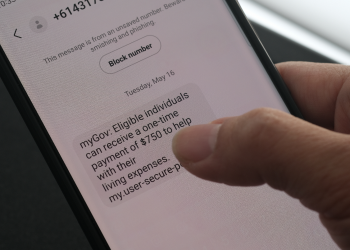Learn about the common types of scams to protect your finances.
At South Carolina Federal Credit Union, we understand how important it is to protect your hard-earned money. Financial fraudsters are becoming harder to recognize, making it more imperative than ever to stay informed about current scams and how to spot them. Here are a few common scams to look out for and what to do if you encounter them:

Fake Checks
Fraudsters will send a counterfeit check, often for a large amount of money, and ask you to deposit it into your account. Then, they will ask you to wire a portion of the funds back to them.
Be wary of any unsolicited checks you receive, especially from unknown sources. Do not send money "back" to anyone who claims to send you a free check. If you receive a check that seems suspicious, do not deposit it and contact us as soon as you can.
Be wary of any unsolicited checks you receive, especially from unknown sources. Do not send money "back" to anyone who claims to send you a free check. If you receive a check that seems suspicious, do not deposit it and contact us as soon as you can.

Phishing
Phishing experts use emails or texts that appear to be from financial institutions, popular retailers, or someone you may know. These messages typically have misspelled words or grammatical errors, and ask you to provide personal or financial information.
Read More

Imposter
Imposters may try to convince you to send them money by pretending to represent trustworthy, well-known organizations, such as the county sheriff, the IRS, or charities. Scammers may even pretend to be a family member and try to guilt trip you into sending them money.
Read More

Debt Collection
Fraudsters pose as debt collectors and attempt to collect debts that you do not owe, or that you have already paid. If you receive a call or message from a debt collector, ask for written verification of the debt. Do not provide your personal information until you can confirm that the collection agency is legitimate.

Romance
A sweetheart scammer creates a fake online profile to establish a romantic relationship with someone solely to request money for various reasons, such as medical emergencies or travel expenses.
Be cautious when communicating with individuals online, especially if they ask for money or pressure you to move the conversation to a different messaging platform. Never send money to someone you haven’t met in person, and be wary of anyone who refuses to video chat or meet in person.
Be cautious when communicating with individuals online, especially if they ask for money or pressure you to move the conversation to a different messaging platform. Never send money to someone you haven’t met in person, and be wary of anyone who refuses to video chat or meet in person.

Employment
Employment scams involve fake job postings that promise high-paying positions with minimal effort. Scammers may ask for payment upfront or request personal information.
Research any job opportunity thoroughly before accepting an offer. Be cautious of job postings that seem too good to be true or require payment upfront. Never provide sensitive information, such as your Social Security number or account details, to an employer without verifying their legitimacy.
Read More
Research any job opportunity thoroughly before accepting an offer. Be cautious of job postings that seem too good to be true or require payment upfront. Never provide sensitive information, such as your Social Security number or account details, to an employer without verifying their legitimacy.
Here to help you





